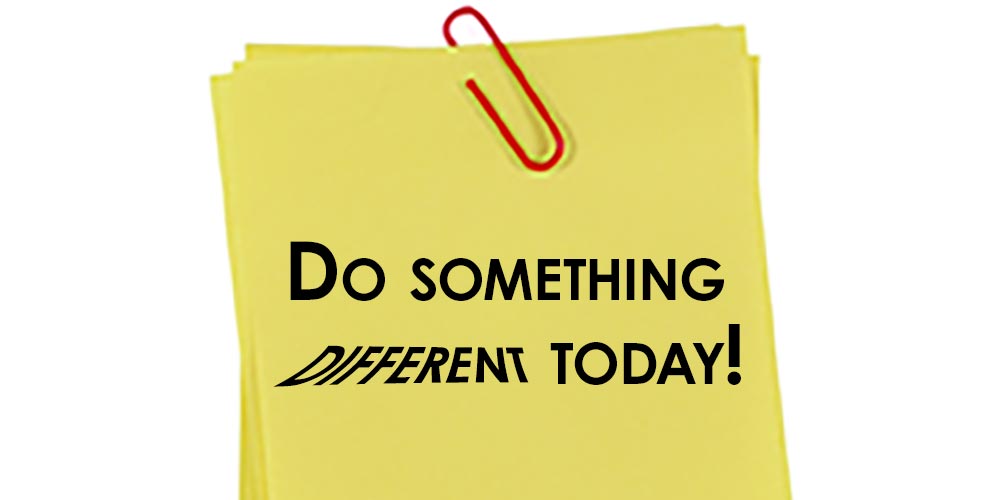Do something different today
The urgent need to learn new skills
One pleasant Sunday, I heeded the call to ‘do something different’. I spent the day learning how to play croquet. In the morning, I had some lessons: the strokes, the rules, the chess-like need to outwit one’s opponent with a cunning plan. Then, in the afternoon, there was a tournament. It turned out to be fun! And I proved not to be the embarrassment to my team that I’d feared. In fact, I actually played a few winning shots!
As I’ve hinted, I don’t really play team ball sports. I never have. Yes, I exercise and I think I’m reasonably fit: yoga, walking, jogging, weights – that sort of thing. But not competitive ball sports. At school, I was one of those nerdy book worms, trying every scheme possible to wriggle out of sport – each class seems to have one or two people like me! So why did I choose to spend a precious Sunday learning how to play a team sport, instead of my more typical weekend activities, such as a gallery jaunt or a Harbour walk?
Most of us are incredibly predictable
Our past habits shape our current and future behaviour to a very significant extent. The same is true at the organisational level. ‘This is how we do things here’ can become a constraining mantra. The challenge is that everything around us, personally and professionally, is constantly changing, making new demands on us. To meet this challenge, we need to be flexible and adaptable – we may need to ‘do something different today’. But our long-standing habits and routines can cement us into the status quo.
Of course, our habits and routines have a terrific upside. When the aircrew switch to autopilot, they can relax a little. They no longer need to be hyper-vigilant. In the same way, we routinely switch on our own autopilot, reducing the demands on our brain’s processing systems. Habits of thinking can provide useful mental shortcuts. It’s often like this in our interactions with others. There are greeting formulas. Conversations can follow a fairly predictable line. You speak to these people, not those. You eat this, not that. You like to see X sort of films, visit Y sort of restaurants, read Z sort of books!
Routine and pattern can be supportive
An important way of getting traction on our goals is to turn positive action steps into habits, so that every day, without having to think too much about it, we make progress. But in this endeavour, we need to strike a balance between the habitual and the new. Both are vital for a successful and fulfilling life.
The trouble is many of our habits may not serve us so well. For instance, negative habits can become embedded as routines, just as well as positive ones! And we can try to tackle new experiences and new situations with old models that just can’t deliver the results we want. Decisions made on autopilot aren’t always the most appropriate. For example, we may fail to notice (and act on) critical aspects of the situation as it really is. This can present serious risks, personally and professionally.
Skills for a productive, satisfying and successful life
Here are a few things we need to be able to do: behave differently to take advantage of an unexpected opportunity; change our minds in the light of new evidence; be open to a new context or a shift in need; become comfortable with uncertainty and complexity; accept fresh ways of thinking and minimise decision risk. The common thread is that you need to do something different. While our habits can guide us, they can also filter and even distort what we see and constrain what we do. Our habitual responses may not always best serve our current goals.
But habits can be hard to change
Organisations know that even with a new policy in place, employees can revert to old behaviours that don’t reflect the agreed new approaches. Frequently, people may even think they’re acting in a new way when they are not. This thinking-doing gap is especially common when an organisation wants to shift its culture, for example towards inclusion and away from outdated biases. Unfortunately, habits bypass conscious processing. Inertia, routine and the pull of the past can be endlessly problematic.
Change leaders can’t simply explain the rationale or ‘business case’ for a new way of doing things and expect that people will align their behaviours. Indeed, we can’t always do this at a personal level either! Even when we feel convinced about the advantage to us of a positive new behaviour, often our willpower is just not strong enough to battle against a lifetime of habits.
Good will and good intentions aren’t enough
We have to do things differently, if we want real change to happen. In fact, psychologists have shown that our behaviour can profoundly shape our thinking. If we behave differently, we start to think differently, as a result of the new experiences we now have and the new results we are now achieving.
Challenging yourself to do something different every day will increase your flexibility, by pulling you out of the comfort zone of your routines and habits. You’ll discover that there are other ways you can behave and that you are far more capable and adaptable than you’d ever imagined.
The aim is to push your current boundaries just a bit by trying some small new behaviours that are feasible and fun. But they need to be things you deliberately identify as outside your typical routine. Like croquet for me! What could you do today that might be a small, deliberate step, taking you outside your usual routines, helping you to open your mind, become more flexible and embrace change? Try it! To test your progress, ask of yourself at the end of every day, ‘Did I do something different today?’
PRACTICAL IDEAS TO APPLY IN YOUR BUSINESS
Have you become a creature of habit?
How often do you:
- Find out about something you don’t know?
- Try something you’re not very good at?
- Change your mind about a belief you’ve held?
- Expand your friendship group?
- Suggest a way of making work more interesting?
- Try a food or drink that’s new for you?
- Socialise with people from a different ethnic group?
- Do something others wouldn’t typically expect of you?
- Seek the opinions of different people?
- Go to a type of event, concert or film you’ve never been to before?
Reflecting on your score:
7-10 = well done, you are fairly open-minded and flexible. Continue challenging yourself!
4-7 = pretty good but perhaps build your flexibility further. Try one small thing each day different from your usual habits.
Below 4 = time for a change! Experiment with doing one very small new or different thing each day next week. Notice how you feel afterwards. Share what you’ve done with a friend.
Adapted from Fletcher & Pine



